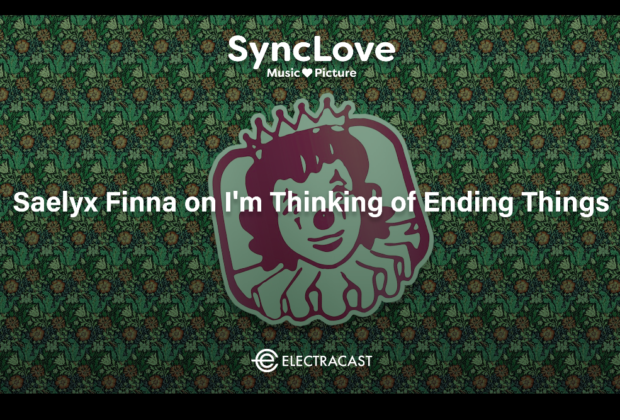SyncLove is a new channel from commercial music licensing platform SyncFloor that sees production professionals dive into their favorite moments in films and the scenes that changed the way they thought about music for picture.
A score doesn’t have to front and center to be emotionally effective. Sometimes, music wafts like a half-remembered dream through a film. Yet as it does, it adds a layer of emotional intensity and otherworldliness that can deepen a story and leave you wondering exactly where objective reality ends and dreamstates begin.
These undercurrents come to the surface in the latest conversation for SyncLove with Saelyx Finna (formerly Courtney Sheehan). Finna joins SyncLove’s host Kirt Debique, CEO and co-founder of SyncFloor, for the next installment in the series that explores the magic when music and picture meet.
 Finna is a dream tech researcher and philosopher at the edge of music and film. She was formerly the artistic and executive director of Northwest Film Forum in Seattle, the largest independent film center in the Pacific Northwest. In her role as director, she frequently commissioned alternate scores for films played live at showings. She has recently devoted herself to understanding dreamstates, not as sources of curious or mystic content, but as a state that reveals the workings of our minds: “I’ve had a longstanding interest in dream neuroscience, the idea of investigating, to the degree that we can in the brain, when we dream… the form that underlies the processes of dreaming…”
Finna is a dream tech researcher and philosopher at the edge of music and film. She was formerly the artistic and executive director of Northwest Film Forum in Seattle, the largest independent film center in the Pacific Northwest. In her role as director, she frequently commissioned alternate scores for films played live at showings. She has recently devoted herself to understanding dreamstates, not as sources of curious or mystic content, but as a state that reveals the workings of our minds: “I’ve had a longstanding interest in dream neuroscience, the idea of investigating, to the degree that we can in the brain, when we dream… the form that underlies the processes of dreaming…”
Saelyx is fascinated by the way tech might help us define, understand, or change dreams and our theories of consciousness--and the ethical implications of this technology. As an example of this tech, she points to the Dormio, “a targeted dream incubation device” that influences the liminal time between sleep and wakefulness (hypnagogia) that’s known for its creative potential. “If you leave out your dream self, you deprive yourself of so much of your own story,” Saelyx notes. “You need to recognize the role of sleep and dream in creating our experience of the world.”
The blurry boundary between waking and dreaming runs through Saelyx’s film choice, Charlie Kaufman’s I’m Thinking of Ending Things (2020), film score by Jay Wadley. The film has a haunting quality, and, as with many of Kaufman’s films, taunts us with questions of who’s really telling the story and where reality shades into fantasy. Kaufman creates narratives that suggest “the impossibility of any objective reality and [that] the internal realities...are much slipperier than just boring, old waking life,” as Saelyx puts it.
It’s a long film, and it can feel bleak and dreary, for all its colorful wallpaper and vintage-cool sets. But it asks a question that turns more realist storytelling approaches on their heads: “What if you start with dream,” with the assumption that “waking consciousness and perceptual experience are more informed by internal inputs” than a single objective reality. Though Saelyx notes this is not new philosophical territory and that the film sometimes drifts toward navelgazing, she is fascinated by how the film’s narrative point of view slowly dissolves, reflecting in part the cultural decline of the community it tries to capture.
The film’s score has a subtle but effective role in this gradual dissolution, adding an emotional undercurrent that enhances the film’s overall unsettling effect. “That juxtaposition [between pastoral, orchestral score and eerie imagery] breeds this unease, as if it's something bubbling up from the unconscious or from the basement,” she says. “The basement figures in this film very prominently, very symbolically, charged with all the things that you imagined psychically to be in the basement.”
There’s a lot stored down in that symbolic basement that can resonate with viewers, especially those who grew up in a community similar to the one imagined in the film. The music has a hand in conjuring this place/time, Saelyx explains: “One of the reasons the film resonated with me is because I'm from rural America. It's not given an actual setting, but Oklahoma!, the musical, figures prominently and is part of that pastoral vibe, coloring the entire quality of the score and the soundtrack.” The film’s enigmatic ending uses a song from the musical, “Lonely Room,” suggesting the darkness hidden behind American idylls and contrasting the cheery surface of American life with the self-destructive depths explored in the film.
While dreams often figure in films, they are usually bookended sequences flanked on either side by solid waking-life narrative. I’m Thinking of Ending Things takes the opposite approach, grounding everything in the dream, in the inner world of a nearly invisible narrator. “The film and what Saelyx talked about regarding the dream space really flip that notion of perspective upside down,” notes Debique. “It says that actually there's this really expansive space that we don't tap into, that’s all about being inside of your head.” The music helps take us there, playing subtly on our feelings and adding to the disorienting suspense of the film.
Check out the podcast episode on SyncLove HERE.
SyncLove is sponsored by SyncFloor, where you can find inspiring music by real artists.
Want music that feels like I’m Thinking of Ending Things in your next production?














